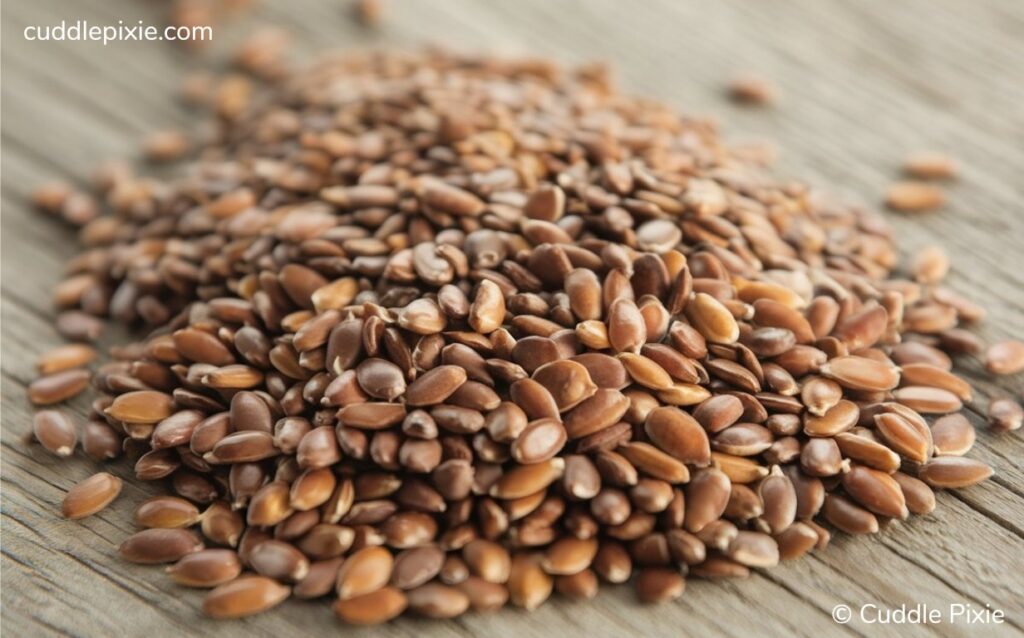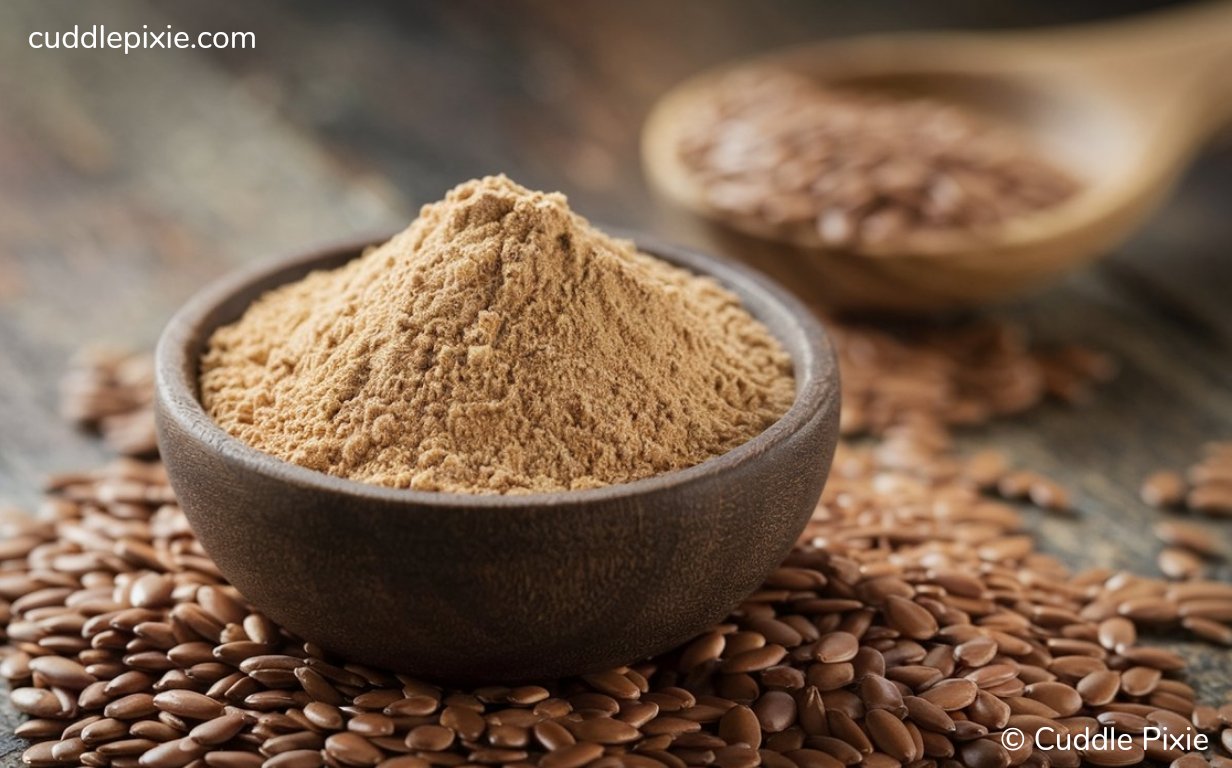As parents, we constantly seek the best nutritional choices to support our baby’s health and development. Flaxseed meal, made by grinding flaxseeds into a fine powder, is gaining recognition as a superfood for infants and children due to its exceptional nutrient profile. In this guide, I’ll share everything you need to know about incorporating flaxseed into your baby’s diet, based on research, professional recommendations, and my experience as a child specialist.
In This Article
The Nutritional Power of Flaxseed Meal
Flaxseeds (Linum usitatissimum) are a powerhouse of essential nutrients. Here’s a breakdown of their key components and their benefits for babies:
- Omega-3 Fatty Acids (ALA): Vital for brain and visual development. Research from the American Journal of Clinical Nutrition highlights ALA’s role in enhancing cognitive performance during early childhood.
- Dietary Fiber: Promotes a healthy digestive system and helps prevent constipation, a common issue during the transition to solids.
- Lignans: Plant-based antioxidants with immune-boosting properties.
- Vitamins and Minerals: Magnesium, phosphorus, and B vitamins contribute to bone health, energy production, and overall growth.
Why It Matters: The rapid physical and neurological growth in the first year of life requires nutrient-dense foods, and flaxseed meal provides a natural, plant-based way to meet these needs.
When and How to Introduce Flaxseed Meal to Your Baby
Babies can start consuming flaxseed meal from six months of age, typically when solid foods are introduced. Follow these guidelines to ensure safety and effectiveness:

1. Start Small
Introduce flaxseed meal in small quantities—start with 1/4 teaspoon per day. Monitor your baby for any adverse reactions, such as digestive discomfort or allergic symptoms.
2. Choose the Right Form
Use ground flaxseed (flaxseed meal) or soaked flaxseeds to prevent choking and enhance nutrient absorption. Whole flaxseeds should be avoided for young babies due to their hard outer shell.
3. Increase Gradually
By the time your baby is one year old, you can increase the serving size to 1 teaspoon per day, depending on their tolerance and dietary needs.
Pro Tip: Always consult with your pediatrician before introducing any new food to your baby’s diet, especially if there’s a history of food allergies in the family.
How to Prepare Flaxseed Meal for Babies
Preparing flaxseed meal is simple and versatile, making it easy to incorporate into your baby’s meals. Here are some methods:
Grinding Flaxseeds
- Use a coffee grinder or food processor to grind whole flaxseeds into a fine powder.
- Store the ground flaxseed in an airtight container in the refrigerator to maintain freshness and nutrient integrity.
Soaking Flaxseeds
- Mix 1 tablespoon of flaxseeds with 2 tablespoons of water.
- Allow the mixture to sit for 20–30 minutes until a gel-like consistency forms.
- Add this gel to purees, oatmeal, or yogurt.
Cooking with Flaxseed Meal
- Add 1/4 teaspoon of flaxseed meal to your baby’s cereal, mashed vegetables, or fruit purees.
- Mix flaxseed meal into homemade baby food recipes, such as muffins or pancakes, for older infants and toddlers.
Recipe Idea: Combine 1/2 teaspoon of flaxseed meal with mashed banana and a dash of breast milk or formula for a nutrient-rich snack.
The Benefits of Flaxseed Meal for Babies
1. Supports Digestive Health
Flaxseed’s high fiber content aids in digestion and prevents constipation. The mucilage, a gel-like substance formed when flaxseeds are soaked, acts as a natural laxative.
- Research Insight: A study in the Journal of Pediatric Gastroenterology and Nutrition found that flaxseed supplementation effectively relieved constipation in children.
2. Enhances Brain Development
The omega-3 fatty acids in flaxseed are essential for brain growth, improving memory, and supporting the nervous system.
- Expert Opinion: “Incorporating plant-based sources of omega-3s early on can have long-term benefits for cognitive health,” says Dr. Marion Nestle, a professor of nutrition at New York University.
3. Boosts Immunity
Flaxseed’s lignans have antioxidant and anti-inflammatory properties, which strengthen the immune system.
How Much Flaxseed Per Day Is Safe for Babies?

The recommended daily intake of flaxseed meal depends on your baby’s age:
- 6–12 months: Start with 1/4 teaspoon daily.
- 1–3 years: Gradually increase to 1 tablespoon per day.
Exceeding these amounts may lead to digestive discomfort or nutrient imbalance, so moderation is key.
Can Babies Be Allergic to Flaxseed?
While rare, flaxseed allergies are possible. Symptoms include:
- Rash, itching, or hives.
- Swelling of the lips, tongue, or face.
- Vomiting or diarrhea.
Action Plan:
- Introduce flaxseed separately from other new foods to identify any potential allergies.
- Seek immediate medical attention if your baby shows severe allergic reactions, such as difficulty breathing.
Does Flaxseed Help with Constipation in Babies?
Yes, flaxseed’s natural fiber and mucilage content make it an effective remedy for constipation. Soaking flaxseeds enhances this property by creating a gel that soothes the digestive tract and eases bowel movements.
Alternatives to Flaxseed Meal for Babies
If flaxseed isn’t suitable for your baby, consider these alternatives:
- Chia Seeds: High in omega-3s and similar in texture when soaked.
- Hemp Seeds: Packed with protein and healthy fats.
- Pumpkin Seeds: A rich source of zinc and iron.
- Oatmeal: A gentle, fiber-rich option for digestive health.
Practical Tips for Parents
- Incorporate Gradually: Mix flaxseed meal into familiar foods to ease acceptance.
- Focus on Balance: Flaxseed should complement a varied diet that includes fruits, vegetables, grains, and proteins.
- Monitor Reactions: Watch for signs of allergy or intolerance during the introduction phase.
FAQs About Flaxseed for Babies
Can I mix flaxseed meal with breast milk?
Yes, adding flaxseed meal to breast milk or formula can enhance its nutritional profile.
Is flaxseed good for toddlers?
Absolutely! It provides essential nutrients for growth and development.
Does flaxseed cause gas?
In some cases, the fiber in flaxseed may cause mild gas. Start with small amounts to minimize this effect.
How much flaxseed should I give my baby daily?
For babies aged 6–12 months, a small amount, such as 1/4 to 1/2 teaspoon of ground flaxseed, is typically sufficient. For toddlers (1–3 years), up to 1 teaspoon per day may be appropriate. Always follow your healthcare provider’s guidance.
Does flaxseed help babies with constipation?
Yes, the dietary fiber in flaxseed can act as a natural remedy for constipation in babies. However, ensure they are also well-hydrated, as fiber works best when paired with adequate fluid intake.
How should I store flaxseed meal?
Ground flaxseed should be stored in an airtight container in the refrigerator or freezer to prevent it from turning rancid. Whole flaxseeds have a longer shelf life and can be stored at room temperature.
Can I use flaxseed as an alternative to other seeds or ingredients?
Yes, flaxseed can serve as a nutrient-rich alternative to chia seeds or eggs in recipes. For instance, a “flax egg” (1 tablespoon of ground flaxseed mixed with 2.5 tablespoons of water) is a common egg substitute in baking.
Final Thoughts
Flaxseed meal is a nutrient-rich addition to your baby’s diet, offering numerous benefits for their growth and development. From promoting digestive health to supporting brain function, it’s a versatile superfood that can easily fit into your family’s meal plan.
As always, consult your pediatrician before introducing any new food to your baby. If you’re ready to explore the potential of flaxseed meal, start small, stay consistent, and watch your baby thrive with every bite.
Reference
- American Journal of Clinical Nutrition. (2018). The role of alpha-linolenic acid (ALA) in brain and cognitive development during early childhood. Retrieved from https://academic.oup.com
- Nestle, M. (2019). Child nutrition and the importance of plant-based omega-3 sources. New York University Press.
- Journal of Pediatric Gastroenterology and Nutrition. (2020). The effects of dietary fiber supplementation on childhood constipation. Retrieved from https://journals.lww.com
- U.S. Department of Agriculture (USDA). (2024). Flaxseeds: Nutritional composition and dietary benefits. Retrieved from https://www.nal.usda.gov
- Mayo Clinic. (2023). Introducing solid foods to your baby: Guidelines and precautions. Retrieved from https://www.mayoclinic.org
